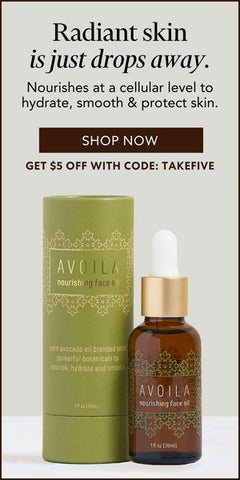
We started Avoila in 2017 at a time when Avoila co-founder, Grace and I were cleaning up our skincare routines among other items within our households. As with many others, our wake up call was related to personal health issues that were starting to show up, and our understanding that the human body can only handle so many toxins before it started to cry for help.
Avoila was created as a plant-based, clean skincare brand to help not only ourselves but others learn ways to clean up their skincare routines. It’s been awhile since we’ve shared what ingredients to avoid and where to shop worry free. We also wanted to provide you with an update on what our state and federal officials are doing related to this topic so you can get involved if you feel so inclined.
Ingredients to Avoid in Skincare
ENDOCRINE DISRUPTORS
These chemicals mimic hormones, impacting your body's natural balance.
- Parabens (methyl, propyl, butyl, etc.):= While research is ongoing, some studies suggest a link to hormone disruption.
- Phthalates Found in fragrance and plastics, they can disrupt hormones.
- Octinoxate & Oxybenzone Common sunscreen ingredients, they may disrupt hormones and harm coral reefs.
- Triclosan & Triclocarban Antibacterial agents with potential endocrine disruption concerns.
IRRITANTS
These can trigger redness, dryness, or itching, especially for sensitive skin.
- Fragrances (Fragrance, Parfum) A catch-all term for many chemicals, artificial fragrance is a major irritant for some.
- Sulfates (SLS, SLES) Harsh cleansing agents that can strip skin's natural oils.
- Formaldehyde & Releasing Agents These preservatives can irritate and are potential carcinogens. Look for "formaldehyde-free" on labels.
- Alcohol (SD Alcohol, Denatured Alcohol) Can be drying and irritating.
- Mineral Oil While not inherently harmful, it can clog pores and prevent proper hydration.

OTHER INGREDIENTS OF CONCERN
- Microplastics Tiny plastic beads harmful to our environment. Look for products labeled "plastic-free."
- Coal Tar Used in some dandruff treatments, it may be carcinogenic.
- Coal-Tar Dyes May irritate skin and some are linked to allergies.
- BHA & BHT Used as preservatives, but some studies raise concerns about potential hormone disruption.
- Siloxanes Silicones used for texture, some may disrupt hormones.
- PEGs (Polyethylene Glycols) May irritate skin and disrupt its natural barrier.
- Aluminum Chlorohydrate & Aluminum Zirconium Anti-perspirant ingredients with potential health concerns, although research is not conclusive.
We know this list is long and it can be hard to remember some of these toxins when looking at skincare ingredient labels. To simplify, look for products with short ingredient lists that feature plant based ingredients.
Safe Alternatives For Great Skin
Don't fret! There are fantastic, safe options:
- Plant Based Oils (jojoba, rosehip, avocado) Nourishing and moisturizing.
- Hyaluronic Acid Hydrates and plumps skin.
- Antioxidants (vitamins C & E, green tea) Fight free radical damage.
- Gentle Cleansers (amino acids, coconut-derived cleansers) Cleanse without stripping.
The Future of Safe Skincare: Regulation & Initiatives
Consumers are demanding more transparency and safety. Here's what's happening.
The FDA (Food and Drug Administration):
This United States government agency has the authority to regulate cosmetics but doesn't pre-approve ingredients like with drugs. And, unlike other countries, the US hasn’t revised their banned ingredients list in over 60 years.
After years of pressure, the FDA recently announced a new regulation called MOCRA (Modernization of Cosmetics Regulations Act) which is meant to help keep consumers safe. However, many feel that this isn’t enough since it isn’t asking manufacturers to eliminate harmful ingredients, or prove that products are safe before hitting the shelves. The long-awaited, historic legislation gives the FDA additional tools to ensure the safety of cosmetics and to protect public health. MoCRA also brings the FDA’s oversight of the beauty and personal care sector more in line with other categories the Agency regulates and contributes to global regulatory alignment.
The California Safe Cosmetics Act
This groundbreaking law restricts specific chemicals in personal care products sold in California. In addition, products containing ingredients on the ‘harmful’ list must be reported to the state via the brand/company selling the product. Unfortunately these products don’t have to report the harmful ingredients on their labels so there’s still a lot of work to be done by the consumer to make sure the products they’re buying are safe.
Where to Buy Safe Products
There are a number of retailers whose mission is to sell only the safest products available to consumers. You can trust these retailers (we have vetted them and trust them) and don’t have to spend extra time researching the ingredients in the products they sell:
Independent retailer in Tampa, Florida. Shop in store or online.
Online retailer with pop-ups in Park City, Utah and surrounding areas.
Clean retailer with several stores around the country and online store.
Clean retailer with several stores around the country and online store.
Be extra careful with retailers like Sephora and Ulta who have clean beauty sections as they may not be as clear about ingredients as the retailers above.











